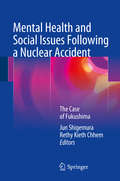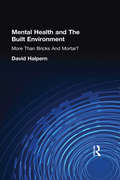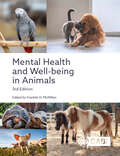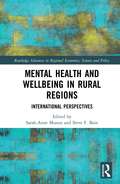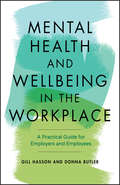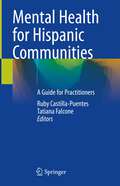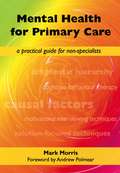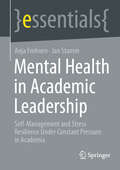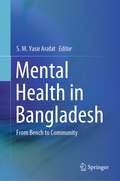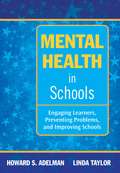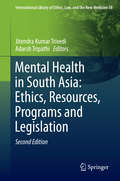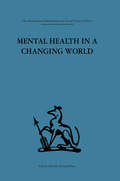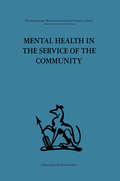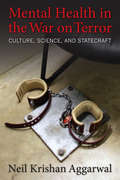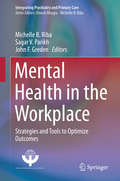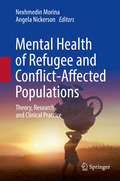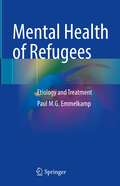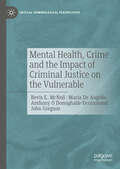- Table View
- List View
Mental Health and Palestinian Citizens in Israel (Indiana Series In Middle East Studies)
by Edited by Muhammad M. Haj-Yahia, Ora Nakash, and Itzhak LevavSocial work studies examining the mental health issues faced by Arab-Palestinian service users, their families, and their communities in Israel.Minorities face particular social strains, and these are often manifested in their overall mental health. In Israel, just under a quarter of the citizens are Arab Palestinians, yet very little has been published exploring the spectrum of mental health issues prevalent in this population. The work collected here draws on the first-hand experience of experts working with Israeli Palestinians to highlight the problems faced by service users, their families, and their communities. Palestinians in Israel face unique social, gender, and family-related conditions that also need reliable research and assessment. Mental Health and Palestinian Citizens in Israel offers research and observation on three central topics: socio-cultural determinants of mental health, mental health needs, and mental health service utilization. From suicidal behaviors and addiction to generational trauma and the particular concerns of children and the elderly, this broad and careful collection of research opens new dialogues on treatment, prevention, and methods for providing the best possible care to those in need.
Mental Health and Palestinian Citizens in Israel (Indiana Series in Middle East Studies)
by Itzhak Levav Edited by Muhammad M. Haj-Yahia Ora NakashMinorities face particular social strains, and these are often manifested in their overall mental health. In Israel, just under a quarter of the citizens are Arab Palestinians, yet very little has been published exploring the spectrum of mental health issues prevalent in this population. The work collected here draws on the first-hand experience of experts working with Israeli Palestinians to highlight the problems faced by service users, their families, and their communities. Palestinians in Israel face unique social, gender, and family-related conditions that also need reliable research and assessment. Mental Health and Palestinian Citizens in Israel offers research and observation on three central topics: socio-cultural determinants of mental health, mental health needs, and mental health service utilization. From suicidal behaviors and addiction to generational trauma and the particular concerns of children and the elderly, this broad and careful collection of research opens new dialogues on treatment, prevention, and methods for providing the best possible care to those in need.
Mental Health and Social Issues Following a Nuclear Accident
by Jun Shigemura Rethy Kieth ChhemThis book focuses on mental health issues arising in the wake of the Fukushima nuclear disaster. Three years after the 11 March 2011 Great East Japan Earthquake, tsunamis, and Fukushima Daiichi nuclear accident, roughly 130,000 individuals continue to face enormous burdens as a result of mandatory evacuation. Many evacuees still live in temporary housing, and returning home remains a distant dream as they wait for the decontamination of the danger zone to be completed. However, the plant recovery process is still evolving, and the complete cleanup will take decades. Beyond all of these hardships, many evacuees are also mourning the loss of their loved ones. The compound disaster with its many uncertainties poses and will continue to pose serious emotional and social challenges. People affected by the nuclear disaster have been facing serious psychological challenges from ongoing fear of radiation exposure. Furthermore, there is continuing debate between various stakeholders on the options for disaster responses. This situation in turn produces adverse public responses, such as discrimination and stigmatization of the evacuees and scapegoating of the authorities and nuclear plant workers. Mental Health and Social Issues Following a Nuclear Accident addresses these issues and their impacts, pursuing both evidence-based and narrative-based approaches. It also contrasts the Fukushima findings with those of other nuclear disasters, namely, Three Mile Island and Cher nobyl.
Mental Health and Social Problems: A Social Work Perspective
by Alex Gitterman Nina Rovinelli HellerMental Health and Social Problems is a textbook for social work students and practitioners. It explores the complicated relationship between mental conditions and societal issues as well as examining risk and protective factors for the prevalence, course, adaptation to and recovery from mental illness. The introductory chapter presents bio-psycho-social and life-modeled approaches to helping individuals and families with mental illness. The book is divided into two parts. Part I addresses specific social problems, such as poverty, oppression, racism, war, violence, and homelessness, identifying the factors which contribute to vulnerabilities and risks for the development of mental health problems, including the barriers to accessing quality services. Part II presents the most current empirical findings and practice knowledge about prevalence, diagnosis, assessment, and intervention options for a range of common mental health problems – including personality conditions, eating conditions and affective conditions. Focusing throughout upon mental health issues for children, adolescents, adults and older adults, each chapter includes case studies and web resources. This practical book is ideal for social work students who specialize in mental health.
Mental Health and The Built Environment: More Than Bricks And Mortar?
by David HalpernThis text explores the relationship between the planned or built environment and the occurrence of mental ill-health. It begins by providing a broad overview of what is known about the causes of psychopathic behaviour. It then goes on to discuss the issues that arise when attempting to identify: the impact of the environment as a source of stress; the effects that the environment can have on the quality of relationships between people; and the relationship between symbolic aspects of the environment, the planning process and mental health. The book uses analysis and case studies drawn from the UK and US and contains example illustrations of the built environment.
Mental Health and Well-being in Animals
Since the publication of the first edition of this book, professional and public concern for the well-being of animals has continued to increase throughout the world. Advances in research and technologies have yielded an enormous amount of new knowledge about animal mental health and well-being. Thoroughly updated and revised, the third edition includes: · Expanded chapters covering fear, boredom and suffering in animals, the what and why of animal fun, and the treatment of mental health disorders in animals. · New chapters covering the new classification systems concerning mental and behavioral disorders of cats and dogs, the importance of resilience and mental states, nutritional factors and recognizing emotional and psychological suffering. · New internationally renowned expert contributors joining the existing list of prestige authors. · A focus on practical information, with clinical behavioral medicine advice, hints and tips. With additional illustrations and photographs throughout, this book remains invaluable to veterinary professionals, animal welfare researchers and advocates, ethologists and other animal caregivers.
Mental Health and Wellbeing in Rural Regions: International Perspectives (Routledge Advances in Regional Economics, Science and Policy)
by Sarah-Anne Munoz Steve F. BainThis book considers how rurality interacts with the mental health and wellbeing of individuals and communities in different regional settings. Through the use of international and comparative case studies, the book offers insight into the spatiality of mental health diagnoses, experiences, services provision and services access between and within rural areas. It is the first book to specifically address rural mental health geographies from an international perspective, and will be of interest to researchers and policymakers in rural studies, regional studies, health geography and rural mental health.
Mental Health and Wellbeing in the Workplace: A Practical Guide for Employers and Employees
by Gill Hasson Donna ButlerProvides guidance for both employers and staff on promoting positive mental health and supporting those experiencing mental ill health in the workplace The importance of good mental health and wellbeing in the workplace is a subject of increased public awareness and governmental attention. The Department of Health advises that one in four people will experience a mental health issue at some point in their lives. Although a number of recent developments and initiatives have raised the profile of this crucial issue, employers are experiencing challenges in promoting the mental health and wellbeing of their employees. Mental Health & Wellbeing in the Workplace contains expert guidance for improving mental health and supporting those experiencing mental ill health. This comprehensive book addresses the range of issues surrounding mental health and wellbeing in work environments – providing all involved with informative and practical assistance. Authors Gill Hasson and Donna Butler examine changing workplace environment for improved wellbeing, shifting employer and employee attitudes on mental health, possible solutions to current and future challenges and more. Detailed, real-world case studies illustrate a variety of associated concerns from both employer and employee perspectives. This important guide: Explains why understanding mental health important and its impact on businesses and employees Discusses why and how to promote mental health in the workplace and the importance of having an effective ‘wellbeing strategy’ Provides guidance on managing staff experiencing mental ill health Addresses dealing with employee stress and anxiety Features resources for further support if experiencing mental health issues Mental Health & Wellbeing in the Workplace is a valuable resource for those in the workplace wanting to look after their physical and mental wellbeing, and those looking for guidance in managing staff with mental health issues.
Mental Health at Work (Penguin Business Experts Series)
by James RoutledgeIt has never been more essential to support our mental health at work. With one in four people experiencing poor mental health right now, we need to start talking about it. Penguin Business Expert James Routledge has worked with CEOs, HR directors, managers and people at all levels on successful mental-health strategies. In this book, he shares his stories, learnings and guidance. Learn how to:- Talk comfortably about mental health- Create a more open and inclusive community in your workplace- Implement unique changes that are authentic to you and your businessFilled with honest and relatable stories, 'conversation starters' and exclusive case studies from a diverse range of businesses and their people, Mental Health at Work will support anyone with their mental health in the workplace journey.
Mental Health at the Crossroads: The Promise of the Psychosocial Approach
by Janet E. WilliamsThis book is a challenge to the enduring status and domination of bio-medical approaches in mental health services. Contributors from four continents argue that this domination, along with modernization and multidisciplinary work, will not improve people's lives unless social and psychological perspectives are appreciated and integrated. This implies new forms of relationships and social arrangements. Mental Health at the Crossroads: the Promise of the Psychosocial Approach is a timely analysis of the psychosocial approach as it resonates across the discipline divide, considering the past and future development. It is written from the perspectives of service users and carers, managers, practitioners, educators, researchers and policy makers, illustrated with case studies from Australia, Brazil, Italy, UK and the USA. This book presents an alternative approach to conventional thinking in mental health, providing a fascinating and valuable resource for those seeking new perspectives, grounded in theory with practice examples, in order to influence the current agenda and change practice.
Mental Health for Hispanic Communities: A Guide for Practitioners
by Tatiana Falcone Ruby Castilla-PuentesThis book is the first authoritative medical text that considers the unique cultural backgrounds of Hispanic populations in a straightforward yet sensitive way, all while building a framework for practical psychiatric assessment and treatment plans. As the only book to consider the unique challenges facing Hispanic mental healthcare, this book is at the forefront of a serious issue that has gone unchallenged for too long. The text is written by two expert psychiatrists with an established history of leadership in this space. Chapters carefully and meticulously establish the issues of access to care in Latinx communities before addressing the unique needs of these patients in the context of common psychiatric disorders. Each disorder includes clinical cases for a reader-friendly approach to the challenges that develop effective assessment and treatment plans. Mental Health for Hispanic Communities is a concise yet comprehensive reference invaluable to all clinicians, students, and other medical professionals seeking to work with this population effectively.
Mental Health for Primary Care: A Practical Guide for Non-Specialists (Radcliffe Ser.)
by Mark Morris David Rogers'This book gives a 'bottom-up', practical overview of mental health. I have distilled psychological, biological and sociological background material and siphoned off anything that is not relevant to primary care. I aim to demystify the management of common problems and empower the reader to have a more rewarding and fun time at work and a better ability to cope with the ever-increasing demand and challenge of dealing with multiple physical and mental health issues often brought by a single individual to a time-limited consultation' - Mark Morris.This book provides an up-to-date guide to mental health for primary care workers who are not experts in the field. It is logically structured, providing a clear overview of causal factors before presenting individual conditions in a diagnostic hierarchy. Particular attention is given to areas where there has been a deficit in understanding or training, along with problems that are most frequently encountered and managed in primary care. Meanwhile, a Psychological Tools section introduces solid practical frameworks for managing mental health problems developed from cognitive behaviour therapy, solution-focused and motivational interviewing techniques. A selection of resources for patients is also included. It includes foreword by: Andrew Polmear MA MSc FRCP FRCGP; Former General Practitioner and Senior Research Fellow, Academic Unit of Primary Care, The Trafford Centre, University of Sussex, September 2008.
Mental Health in Academic Leadership: Self-Management and Stress Resilience Under Constant Pressure in Academia (essentials)
by Anja Frohnen Jan StammLeaders in academia need dependable strategies to support and strengthen their mental health. This essential guide explores the unique challenges within the academic system and offers practical solutions for managing stress. Overcoming stress-inducing thought patterns fosters resilience, while smart work organization—such as the Management House method—can unlock significant relief potential. This resource provides valuable insights for human resource development and workplace health management in higher education institutions. A practical and empowering guide for academic leaders.
Mental Health in Bangladesh: From Bench to Community
by S. M. Yasir ArafatThis book is about mental health in Bangladesh. Bangladesh is a densely populated country in South Asia with a population of about 170 million. It has seen significant economic growth over the last decades, and it has recently improved from being a low-income country to a lower middle-income country. Currently, Bangladesh is facing a double burden of disease, i.e., both communicable and non-communicable. About 60% of the disease burden is incured by non-communicable diseases. Mental disorders are one of the top five burdens of non-communicable disease in the country. However, psychiatry is a neglected issue in Bangladesh. There are high stigma, services gaps, out-of-pocket expense, low mental health literacy, and extreme scarcity of budget. Academically, it has also been under-addressed and under-researched. Therefore, the editor aims to provide a comprehensive book on mental health in Bangladesh, based on existing evidence and expertise, focusing on academic aspects of community mental health service.
Mental Health in China and the Chinese Diaspora: Historical and Cultural Perspectives (International and Cultural Psychology)
by Harry MinasFollowing on the previous volume, Mental Health in Asia and the Pacific, which was co-edited with Milton Lewis, this book explores historical and contemporary developments in mental health in China and Chinese immigrant populations. It presents the development of mental health policies and services from the 19th Century until the present time, offering a clear view of the antecedents of today’s policies and practice. Chapters focus on traditional Chinese conceptions of mental illness, the development of the Chinese mental health system through the massive political, social, cultural and economic transformations in China from the late 19th Century to the present, and the mental health of Chinese immigrants in several countries with large Chinese populations. China’s international political and economic influence and its capabilities in mental health science and innovation have grown rapidly in recent decades. So has China’s engagement in international institutions, and in global economic and health development activities. Chinese immigrant communities are to be found in almost all countries all around the world. Readers of this book will gain an understanding of how historical, cultural, economic, social, and political contexts have influenced the development of mental health law, policies and services in China and how these contexts in migrant receiving countries shape the mental health of Chinese immigrants.
Mental Health in Schools: Engaging Learners, Preventing Problems, and Improving Schools
by Howard S. Adelman Linda TaylorFor many children, schools are the main or only providers of mental health services. In this visionary and comprehensive book, two nationally known experts describe a new approach to school-based mental health—one that better serves students, maximizes resources, and promotes academic performance. The authors describe how educators can effectively coordinate internal and external resources to support a healthy school environment and help at-risk students overcome barriers to learning. School leaders, psychologists, counselors, and policy makers will find essential guidance, including: • An overview of the history and current state of school mental health programs, discussing major issues confronting the field • Strategies for effective school-based initiatives, including addressing behavior issues, introducing classroom-based activities, and coordinating with community resources • A call to action for higher-quality mental health programming across public schools—including how collaboration, research, and advocacy can make a difference Gain the knowledge you need to develop or improve your school's mental health program to better serve both the academic and mental health needs of your students!
Mental Health in South Asia: Ethics, Resources, Programs and Legislation
by Jitendra Kumar Trivedi Adarsh TripathiAsia is by far the largest continent in the world in terms of area with population exceeding 3. 5 billion and has dozens of cultures, religions, languages and ethnic groups. As a result of its highly varied political systems, Asia also spawns a wide variety of health care systems including mental health care systems, often based on historical roots and at times colonial heritages. The people who suffer from mental or neurological disorders in the continent form a vulnerable section of society and often face stigma, discrimination and marginalization in all societies, and this increases the likelihood that their human rights will be violated This book tackles the issue of mental health legislation in South Asia The first of its kind, it addresses an issue that is necessary for protecting the rights of people with mental disorders and serves as an essential text for reinforcing mental health policy in South Asia It is a timely addition to our global understanding of mental health and how different regions address it.
Mental Health in a Changing World: Volume one of a report on an international and interprofessional study group convened by the World Federation for Mental Health
by Kenneth Soddy Robert H Ahrenfeldt Mary C KidsonTavistock Press was established as a co-operative venture between the Tavistock Institute and Routledge & Kegan Paul (RKP) in the 1950s to produce a series of major contributions across the social sciences. This volume is part of a 2001 reissue of a selection of those important works which have since gone out of print, or are difficult to locate. Published by Routledge, 112 volumes in total are being brought together under the name The International Behavioural and Social Sciences Library: Classics from the Tavistock Press. Reproduced here in facsimile, this volume was originally published in 1965 and is available individually. The collection is also available in a number of themed mini-sets of between 5 and 13 volumes, or as a complete collection.
Mental Health in the Athlete: Modern Perspectives and Novel Challenges for the Sports Medicine Provider
by Eugene Hong Ashwin L. RaoThis unique book provides a practical framework for and coverage of a broad range of mental health concerns applicable to the care of athletes, including depression, suicide, mood disorders, substance abuse and risk-taking behaviors. To this end, it presents content relevant to the care of athletes, including doping and the use of performance-enhancing drugs, the mental health impact of concussion, bullying and hazing, the impact of social media and exercise addiction, among other pertinent topics. Current basic and translational research on behavioral health and the relationship of brain to behavior are reviewed, and current treatment approaches, both pharmacological and non-pharmacological (including mindfulness training), are considered. This practical resource targets the stigma of mental in athletes in order to overcome barriers to care by presenting a definitive perspective of current concepts in the mental health care of athletes, provided by experts in the field and targeting sports medicine providers, mental health providers and primary care physicians involved in the direct care of recreational and competitive athletes at all levels.
Mental Health in the Service of the Community: Volume three of a report of an international and interprofessional study group convened by the World Federation for Mental Health
by Kenneth Soddy Robert H AhrenfeldtTavistock Press was established as a co-operative venture between the Tavistock Institute and Routledge & Kegan Paul (RKP) in the 1950s to produce a series of major contributions across the social sciences. This volume is part of a 2001 reissue of a selection of those important works which have since gone out of print, or are difficult to locate. Published by Routledge, 112 volumes in total are being brought together under the name The International Behavioural and Social Sciences Library: Classics from the Tavistock Press. Reproduced here in facsimile, this volume was originally published in 1967 and is available individually. The collection is also available in a number of themed mini-sets of between 5 and 13 volumes, or as a complete collection.
Mental Health in the War on Terror: Culture, Science, and Statecraft
by Neil Krishan AggarwalNeil Krishan Aggarwal's timely study finds that mental-health and biomedical professionals have created new forms of knowledge and practice in their desire to understand and fight terrorism. In the process, the state has used psychiatrists and psychologists to furnish knowledge on undesirable populations, and psychiatrists and psychologists have protected state interests.Professional interpretation, like all interpretations, is subject to cultural forces. Drawing on cultural psychiatry and medical anthropology, Aggarwal analyzes the transformation of definitions for normal and abnormal behavior in a vast array of sources: government documents, professional bioethical debates, legal motions and opinions, psychiatric and psychological scholarship, media publications, and policy briefs. Critical themes emerge on the use of mental health in awarding or denying disability to returning veterans, characterizing the confinement of Guantánamo detainees, contextualizing the actions of suicide bombers, portraying Muslim and Arab populations in psychiatric and psychological scholarship, illustrating bioethical issues in the treatment of detainees, and supplying the knowledge and practice to deradicalize terrorists. Throughout, Aggarwal explores this fascinating, troublesome transformation of mental-health science into a potential instrument of counterterrorism.
Mental Health in the Workplace: Strategies and Tools to Optimize Outcomes (Integrating Psychiatry and Primary Care)
by Michelle B. Riba Sagar V. Parikh John F. GredenThis book offers a guide to better understanding models of workplace mental health, as well as best practices for mental health professionals, employee assistance groups, employers and employees alike. The cost of depression at the workplace is staggering, both in terms of absenteeism and productivity loss while at work, and in terms of human and family suffering. Depression is highly prevalent and affects employees’ concentration, decision-making skills and memory, contributing to accidents and quality issues. Analyses indicate that the returns on investment for workplace mental health programs are significant, with employers reporting lower productivity-related financial losses and less need staff turnover due to mental health conditions. The book also addresses substance use and misuse, and ways to address such problems.
Mental Health of Refugee and Conflict-Affected Populations: Theory, Research and Clinical Practice
by Nexhmedin Morina Angela NickersonThis book provides an overview of theoretical, empirical, and clinical conceptualizations of mental health following exposure to human rights violations (HRV). There are currently hundreds of millions of individuals affected by war and conflict across the globe, and over 68 million people who are forcibly displaced. The field of refugee and post-conflict mental health is growing exponentially, as researchers investigate the factors that impact on psychological disorders in these populations, and design and evaluate new treatments to reduce psychological distress. This volume will be a substantial contribution to the literature on mental health in refugee and post-conflict populations, as it details the state of the evidence regarding the mental health of war survivors living in areas of former conflict as well as refugees and asylum-seekers.
Mental Health of Refugees: Etiology and Treatment
by Paul M.G. EmmelkampThe book provides a comprehensive review of mental health in refugees by discussing its multiple dimensions, and analyzing epidemiology, etiology, and culturally adapted assessment and treatment. Key topics include why certain refugees cope successfully with traumatic experiences while others do not, and the biological, psychological, and social processes underlying posttraumatic stress disorder, common mental disorders, substance abuse and personality disorders.The text examines topics such as complexities of diagnosis, treatment, and recovery for refugees. Furthermore, the roles of culture, social support, and mental health workers in the process of overcoming mental health problems in refugees are discussed. Together, the chapters provide an in-depth examination of the current understood causes, and impacts of mental health problems and treatment of refugees to inform future work in the field. The book gives its readers a solid basis for understanding mental health problems of refugees and sets out to present practitioners with a state-of-the-art summary of all the latest developments and practical guidance. Furthermore, this book provides the practitioner with instructions on how culturally adapted treatments can be used not only with adults, but also with children and young people to help the practitioner to prepare for working with this difficult client group. Drawing from a range of different fields of study, this text will appeal to readers across psychological, mental health, medical, and academic disciplines.
Mental Health, Crime and the Impact of Criminal Justice on the Vulnerable (Critical Criminological Perspectives)
by John Gregson Bevis E. McNeil Maria De Angelis Anthony Ó Donnghaile-DrummondThis book addresses a variety of key issues surrounding mental health and the criminalization of certain individuals and groups by the Criminal Justice System and the impact this can have on their mental health. It challenges the assumption that people with mental health problems are in some way a risk or danger to society (and themselves) and therefore have a greater propensity for committing crimes, when in reality they are more likely to become the victims of crime. It argues that the misguided correlations drawn between mental health and crime, as perpetuated by the media, policy makers, clinicians, agents of the criminal justice system, and ultimately the public, lead to the criminalization of the vulnerable. Furthermore, the criminalization, stigmatization, stereotyping, labelling and discrimination endured by people with mental health problems has a devastating effect on their mental health and well-being and has negative consequences for society as a whole. Each chapter focuses on a specific area relating to mental health, identifying key themes and issues, as well as offering recommendations for improvements with regards to the treatment and support for people with mental health problems. In addition, the treatment of offenders with mental health problems who engage with the criminal justice system and its services, such as the police, prison and probation services, is critically evaluated.


